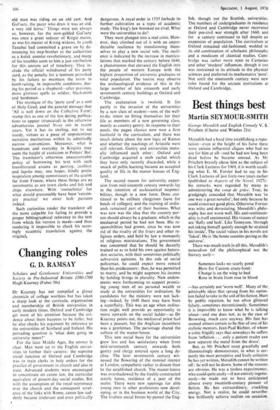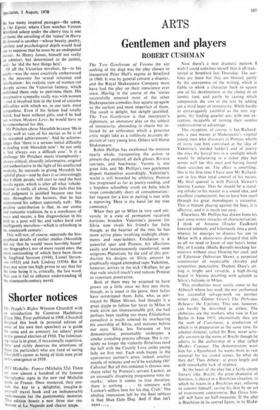Best things best
Martin SEYMOUR-SMITH
George Meredith and English Comedy V. S. Pritchett (Chatto and Windus 21s) Meredith had a hard time establishing a repu- tation—even at the height of his fame there were certain influential cliques who had no use for him at all—and he had not long been dead before he became unread. As Mr Pritchett bravely chose him as the subject of his Clark Lectures for 1969, it is worth recall- ing what E. M. Forster had to say in his Clark Lectures of just forty-two years earlier (published as Aspects of the Novel, 1927): his remarks were regarded by many as administering the coup de grace. True, he grudgingly conceded that Meredith was 'in one way a great novelist'; but only because he could construct good plots. Otherwise Forster was witty and devastating. Meredith's philo- sophy has not worn well. His anti-sentiment- ality is itself sentimental. His visions of nature are 'fluffy and lush'. Like Tennyson, 'through not taking himself quietly enough he strained his inside'. The social values in his novels are `faked'. He is 'the home counties posing as the universe'.
There was much truth in all this. Meredith's naturalism (of the philosophical not the literary sort)— Sameness locks no scurfy pond Here for Custom crazy-fond : Change is on the wing to bud Rose in brain from rose in blood —has certainly not 'worn well'. Many of the admirable ideas that sprang from his optim- ism failed to take in the soil of his fiction. Hurt by public rejection, he too often glittered falsely, sometimes meretriciously. Sometimes it is impossible to know what he is talking about—and one does not, as in the case of Browning, much care anyway. His fate has seemed almost certain to be that of one of his stylistic mentors, Jean Paul Richter, of whom a critic frigidly says that nowadays he suffers from 'inflation . . . only a patient reader can now separate the metal from the dross'.
But, as Mr Pritchett most gracefully and illuminatingly demonstrates, in what is cer- tainly the most perceptive and lively criticism he has yet written, Meredith cannot be written off : he will not lie down. Some of the reasons are obvious. He was a tireless experimenter, who could quite easily—if not entirely ingenu- ously—be made out to have anticipated almost every twentieth-century pioneer of fiction. He has extraordinary, crackling energy. Not a realist, he could neverthe- less brilliantly achieve realism on occasion.
He has many inspired passages—the scene, in The Egoist, where Clare watches Vernon Whitford asleep under the cherry tree is one of them; the unveiling of the 'statue' in Harry Richmond is another—whose beauty, poetry, subtlety and psychological depth would lead one to suppose that he must be an undisputed master. As Henry James, himself not really an admirer, but determined to do justice, said : he 'did the best things best'.
Of all the Victorian novelists, he—to his credit—was 'the most creatively embarrassed by the necessity for sexual reticence and falsification: his realistic view of women cut sharply across the Victorian fantasy, which enshrined them only to patronise them. His imaginative sympathy really was with women —and it involved him in the kind of extreme difficulties with which we, in our turn, must sympathise. Even if his fiction had totally failed, had been without gifts, and if he had not written Modern Love, he would have to be remembered for this.
Mr Pritchett chose Meredith because 'He is pretty well at vain of his messes as he is of his accepted achievements'. And he acknow- ledges that 'there is a serious initial difficulty in dealing with Meredith now': he not only is 'but always was a difficult case'. It is a challenge Mr Pritchett meets triumphantly : always critical, absurdly informative, original and authoritative in the light of his unaffected modesty, he succeeds in giving Meredith his rightful place—and he does it so interestingly that I think people will start to read the best novels again, which is after all what `rehabi- litation' is really all about. One feels that his final judgment is justified because one has seen, throughout the lectures, that he has understood his subject supremely well: 'His positive contribution is that, in our comic and romantic tradition, he is a storehouse of ways and means, a fine diagnostician in his field as a poet will be; and rather hard and intelligently merciless—which is refreshing in the nineteenth century'.
This will not, of course, supersede the bio- graphical details of earlier studies (Meredith did say that he would 'most horribly haunt' any biographer), nor of more recent ones, the most outstanding of which have been those by Siegfried Sassoon (1948), Lionel Steven- son (1953) and Jack Lindsay (1956). But it does not seem too high praise to say that for the time being it is, critically, the last word. Nor can it fail to enhance understanding of the nineteenth-century novel.































 Previous page
Previous page